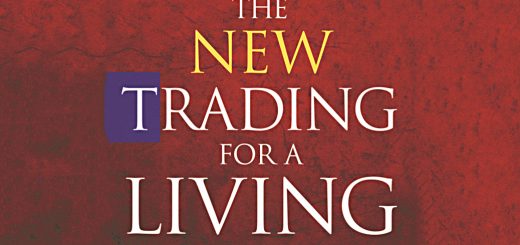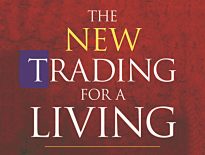Trading For A Living #1 – Psychology

Today’s post is our first visit to a new (but classic) book – Trading for a Living by Alexander Elder.
Contents
Trading for a Living
Trading for a Living was first published in 1993 and has been recommended to me by many traders and websites, but I’ve never read it before.
- We’ll be looking at the revised version – called The New Trading for a Living – which came out in 2014.
Alexander Elder is someone who I know very little about, other than that he has written several popular books.
- I also know he has worked as a psychiatrist and that he stresses the importance of psychology in trading.
From reading the start of this book I now know that Elder was born in Russia, trained as a doctor and worked onboard ships.
- He jumped a ship in Ivory Coast and was granted asylum in the US embassy.
He qualified as a psychiatrist and worked in hospitals to put together a stake for several false starts as a trader.
- Now he mostly trades and does some teaching.
Four factors
In the preface to the new edition, Elder says that there are four pillars to success:
- psychology
- trading tactics
- money management, and
- record-keeping.
It is a typical beginner mistake to focus exclusively on indicators and trading systems.
You have to analyze your feelings as you trade to make sure that your decisions are sound.
Your trades must be based on clearly defined rules.
You have to structure your money management so that no string of losses can kick you out of the game.
You can succeed in trading only if you handle it as a serious intellectual pursuit. Emotional trading is lethal. To help ensure success, practice defensive money management.
To be a good trader, you need to trade with your eyes open, recognize real trends and turns, and not waste time or energy on fantasies, regrets, and wishful thinking.
Losing
Why do most traders lose? Markets are set up so that most traders must lose money. The industry slowly kills traders with commissions and slippage.
Exchanges, regulators, brokers, and advisors live off the markets, while generations of traders keep washing out. Markets need a fresh supply of losers to bring money into them.
Trading is a minus-sum game. Winners receive less than what losers lose because the industry drains money from the markets.
Being simply “better than average” is not good enough. You have to be head and shoulders above the crowd to win a minus-sum game.
Commissions and slippage
Shop for the lowest possible commissions. Tell your broker it is in his best interest to charge you low commissions because you will survive and remain a client for a long time. Design a trading system that will trade less often.
An average trader spends three times more on slippage than on commissions. I almost always use limit orders and resort to market orders only when placing stops.
When a stop level gets hit, it becomes a market order. When a trade is flaming out, it’s not the time to economize. Get in slow but get out fast.
To reduce slippage, trade liquid, high-volume markets and avoid thinly traded stocks. Go long or short when the market is quiet, and use limit orders. Market orders get filled at the bad side of bid-ask spreads.
Individual psychology
Markets offer vast opportunities for self-sabotage, as well as for self-fulfillment. Acting out your internal conflicts in the marketplace is a very expensive proposition.
Traders who are not at peace with themselves often try to fulfill their contradictory wishes in the markets. If you don’t know where you are going, you’ll wind up somewhere you never wanted to be.
Fantasies
Most people who grow up in Western civilization have several similar fantasies. Many people have a fantasy in childhood that they were adopted.
This fantasy seems to explain the unfriendly and impersonal world. It consoles a child but prevents him from being aware of a reality he’d rather not see–that his parents aren’t that good.
A successful trader must identify his fantasies and get rid of them.
Losers who suffer from the “brain myth” will tell you, “I lost because I didn’t know trading secrets.”
Many losers think that they would trade successfully if they had a bigger account. The true problem is overtrading and sloppy money management.
A trader who wants to survive and prosper must control losses. You do that by risking only a tiny fraction of your equity on any single trade.
Traders who believe in the autopilot myth think that the pursuit of wealth can be automated. Some try to develop an automatic trading system, while others buy systems.
Markets are always changing. Yesterday’s rigid rules will work less well today and will probably stop working tomorrow.
Gurus
Traders in distress often seek directions from assorted gurus.
Market cycle gurus call important market turns.
Method gurus promote new highways to riches.
Still others – dead gurus – have escaped criticism and invited cult following through the simple mechanism of departing this world.
As an intelligent trader, you must realize that in the long run, no guru is going to make you rich.
Self-destruction
Trading appeals to impulsive people, gamblers, and those who feel that the world owes them a living. If you trade for the excitement, you’ll inevitably take trades with bad odds and accept needless risks. Emotional trading always results in losses.
The key sign of gambling is the inability to resist the urge to bet. If you feel that you are trading too much and the results are poor,stop trading for a month.
After practicing psychiatry for decades, I became convinced that most failures in life are due to self-sabotage.
We fail in our professional, personal, and business affairs not because of bad luck or incompetence, but to fulfill an unconscious wish to fail.
When traders get in trouble, they tend to blame others, bad luck, or anything else. It hurts to look within yourself for the cause of your failure.
The mental baggage from childhood can prevent you from succeeding in the markets. You have to identify your weaknesses and work to change.
Trading diary
Keep a trading diary. Write down your reasons for entering and exiting every trade. Look for repetitive patterns of success and failure.
There is no safety net in trading, which makes it more dangerous than most human endeavors. The markets offer endless opportunities to self-destruct.
They operate without normal human helpfulness. Trading is the most dangerous human endeavor, short of war.
Stop blaming your losses on bad luck or on others, and take responsibility for your results. Those who don’t learn from the past are condemned to repeat it.
AA
Like most psychiatrists, I always had some patients with alcohol problems.
I jumped at a chance to attend an AA meeting, and I was amazed by what I heard.They talked about alcohol, but as long as I substituted the word “loss” for “alcohol,” most of what they said applied to my trading. I left that meeting knowing that I had to handle my losses the way AA handles alcoholism.
Elder believes that AA’s 12-step program applies to trading, in the same way it applies to gambling.
A social drinker stops when he feels he’s had enough. Once an alcoholic takes a drink, he feels an urge to continue until he passes out or his money runs out.
Denial and rock bottom
Alcoholics deny that alcohol controls their lives. A drunk can begin his journey to recovery only after he admits that he is an alcoholic. Most can face it only after they hit rock bottom.
The first step of AA is the hardest: to admit that one is powerless over alcohol. If alcohol is stronger than you, then you can never touch it again, not even a sip, for as long as you live.You have to give up drinking forever. Most drunks do not want to give up that pleasure.
One of the best things that a trader can do is go to an AA meeting, especially when on a losing streak.
Loss
Loss is to a loser what alcohol is to an alcoholic. A loser keeps switching between different markets, gurus, and trading systems, trying to recreate the pleasurable sensation of winning.
Successful traders treat drawdowns the way social drinkers treat alcohol. They have a little and stop. If they take several losses in a row, they take that as a signal that something isn’t working. It’s time for a break.
Losers cannot stop – they keep trading because they are addicted. Trader’s Rock Bottom is when you lose money you cannot afford to lose.
Recovery
Recovering alcoholics struggle to stay sober, one day at a time. A trader has to struggle to trade without losses, one day at a time.
Draw a line between a businessman’s risk and a loss. As traders, we always take businessman’s risks, but we may never take a loss greater than this predetermined risk.
You need to define your risk – the maximum amount of money you’ll lose on any single trade.
This depends on the size of your trading account, your trading method and your pain tolerance. The absolute maximum is 2% of account equity.
Every morning before trading I suggest saying: “Good morning, my name is so-and-so, and I am a loser. I have it in me to do serious financial damage to my account.”
Records
Good businessmen keep good records.
Your trading records must show the date and price of every entry and exit, slippage, commissions, stops, all adjustments of stops, reasons for entering, objectives for exiting, maximum paper profit, maximum paper loss after a stop was hit, and any other data necessary to review and fully understand your trade later in the future.
The ocean
The market doesn’t know you exist. You can do nothing to influence it. You can only control your behavior.
The ocean doesn’t care about your welfare, but it has no wish to hurt you either. A sailor cannot control the ocean, but he can control himself.
He can study currents and weather patterns, learn good sailing techniques, and gain experience. He can learn when to sail and when to stay in the harbor.
A sailor whose boat is being battered by ocean winds battens his sails – reduces his sail area.The first remedy for a trader battered by the market is to reduce the size of his trades.
Rules
Elder provides a list of the rules that have helped him in his progression as a trader:
- Decide that you are in the market for the long haul
- You want to be a trader even 20 years from now.
- Learn as much as you can.
- Read and listen to experts, but keep a degree of healthy skepticism about everything.
- Ask questions, and do not accept experts at their word.
- Do not get greedy and rush to trade – take your time to learn.
- The markets will be there, offering more good opportunities in the months and years ahead.
- Develop a method for analyzing the market – “If A happens, then B is likely to happen.”
- Test everything on historical data and then in the markets, using real money.
- Markets keep changing – you need different tools for bull and bear markets and transitional periods and a method for telling the difference.
- Develop a money management plan.
- Your first goal must be long-term survival.
- Your second goal, a steady growth of capital.
- Your third goal, making high profits.
- Be aware that the trader is the weakest link in any trading system.
- You must look within yourself, strip away your illusions, and change your old ways of being, thinking, and acting.
Conclusions
That’s it for today.
- We’re only around an eighth of the way through a fairly long and dense book.
But so far I’m impressed.
- It’s written to a better standard than most trading books, and I like the emphasis to date on psychology.
The parallels with AA are new to me, and while they are perhaps unduly extended, they ring true.
I’ll be back in a few weeks with the next couple of sections, which look at mass psychology and classic chart patterns.
Until next time.















